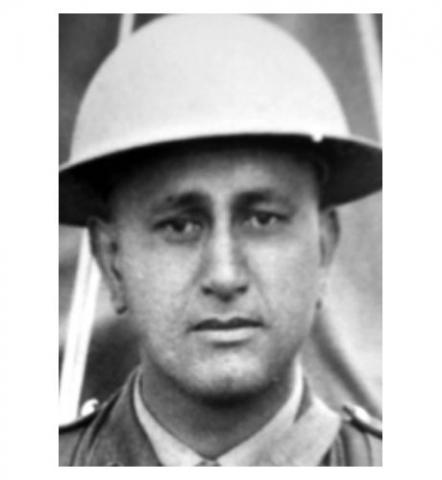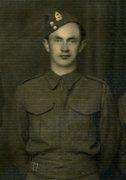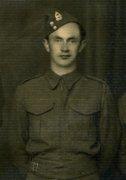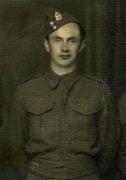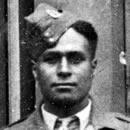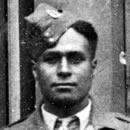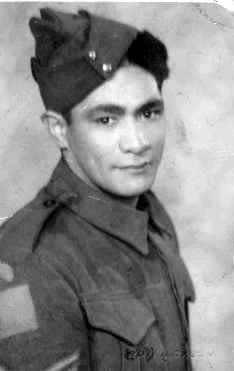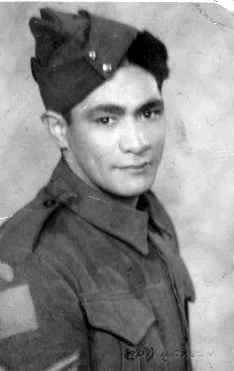<p><strong>This <acronym title="ditty, short song">ruri</acronym> </strong><strong><em> [<a href="#ftn1">1</a>]<a name="ftnref1"></a></em> was written by Wiremu Raerena for Captain Arnold Reedy (C Company, Main Body). In introducing the ruri Sir Apirana Ngata explains that it was composed during a time when Reedy was reported missing on Crete. </strong></p><p>The Allies evacuated from Crete in May 1941 but they could not take everyone. Reedy volunteered to remain on the island after realising a number of his relatives would be left behind. </p><p>Kawa Kaa and Te Kooti Reihana from Reedy’s platoon wrote to his mother Materoa Reedy about this:<br /><em>“Ko te Whio Parae, Ted Wanoa (na te Matauru Wanoa) me Arthur Brooking (na Taken) nga hoa o Nehe i mau ai. Kei te mohio rawa atu maua ko taku tuakana ko Kawa, ko matau hoki te ope whakamutunga o nga Maori ki te piki mai ki runga tima. Ka eke tonu mai a ia mehemea a ia i haere mai. Ka pewhea hoki a te Whio ma. Kei whea he pakeke mo ratau? Na reira a Nehe i noho ai.” [<a href="#ftn2">2</a>]<a name="ftnref2"></a><br /></em></p><p><em>Translation: “Whio Parae [Wish Manuel], Ted Wanoa (Matauru Wanoa’s son) and Arthur Brooking (Duncan’s son) were captured with Nehe. My cousin Kawa and I are certain of this as we were the last Maori to board the ship. He could have been with us if he wished to. But what about Whio and the others? Who would be an elder for them? That is why Nehe stayed behind.” <br /></em></p><p>After waiting overnight for the ships to collect them, the men were told that no ships would be coming. Reedy along with 71 other Maori were taken as prisoners of war. He spent four years in captivity in Germany and returned home aboard the <em>Mauretania </em>reaching New Zealand on August 5, 1945.</p><p>NB: Site editors note - there is static throughout the recording.</p><p><strong>Reference</strong><br />[<a href="#ftnref1">1</a>]<a name="ftn1"></a> Sir Apirana Ngata, Nga Moteatea: Part 1, 1928, p. xxv<strong></strong></p><p>[<a href="#ftnref2">2</a>]<strong><a name="ftn2"></a> </strong>Monty Soutar, Nga Tama Toa, 2009, p.153</p>
Media library
Audio
<p><strong>Sound file</strong> from Ngā Taonga Sound & Vision, ref: <a href="https://www.ngataonga.org.nz/collections/catalogue/catalogue-item?recor…;. Any re-use of this audio is a breach of copyright.</p><p><strong>Image</strong> Nga Taonga a Nga Tama Toa Trust</p>
<p>John Palmer of D Company was part of a ten-man section belonging to 17 Platoon left behind in dense bush near the foot of the steep Mavroneri Gorge (Greece) in 1941. After a brief frantic fight with German forces the order to withdraw was passed along Battalion lines. It was a dark wet and windy night and word never reached the section to which John Palmer belonged.</p><p>In the final part of this three part interview John talks about their plans to head for the coast and make their way to Turkey. He recalls the large German convoy they had to avoid, the Germans operatic singing, potato patches, avoiding being shot and then ultimately being captured and interment as a prisoner of war.</p><h2>Transcript (edited)</h2><p>Coming back, the day we climbed to the top of the round mountains, we saw the first two scouts of the German convoy coming through the valley. We could see them, maybe a couple of miles away I suppose, two black specs. From that day on for twenty four hours a day, this convoy, German's convoy, because it was the only road through you see, day in and day out. And ah, where we were, the road was here, the river was here, the hill was here like that you see. How we wanted to get down, down to the coast, somehow, because we couldn't get down this way. We split up in pairs to find our own way across the road. That's right, we'd seen a tree way in the distance and we were to meet there 3 o'clock the next afternoon. So okay. The corporal and I, we got together. It was about a hundred yards I suppose from the road. There was a potato patch down by the road. I remember both of us crawling through the rows of potatoes till we got on the edge of the road. This is night time. And periodically, the convoy stopped, we presume because it was a mountainous trail to let the front lot get to the top you see, and then they'd carry on afterwards. And every so often the convoy would stop, that's right, and all the lights would go out, the whole convoy. Someone would blow a whistle, the lights come on and away they went. While we were waiting there were troop carriers, that's right, and the singing you've never, honest mate you've never heard anything like it. It was semi-classical singing, opera stuff. And it was beautiful. The evening was a clear starry night, you know. We were laying in between the rows of potatoes listening to the singing. Well that's when the convoy stopped, you see. So we said we'd have to get across the road. The convoy stopped, the lights went out so corporal says, "Here we go." So we're off across the road. As soon as we hit the road the whistle went, the lights went on and we tumbled down the other side of the road and there was a paddock or whatever. I forget how far, we ran for our lives and expected to be shot. Which didn't eventuate. Anyway, we found an old shed, with fern or whatever, we stayed there the night, we slept there. The next day we had to get across the river. So we eventually found a fording place, we got across the river. Arrived at this tree, six of us did but two didn't arrive. So we waited and waited and waited, we left a note saying we're off we can't wait for you any longer. The idea then was to make our way down to the coast, steal a boat or whatever and off to Turkey and be interned you see. That's when we ran into this, they must've been a labour corps, they were fixing up the roads. The roads had been bombed, you know. And this officer was there. Because the Greeks, they were dark like us Maoris and a lot of them wore more or less the same uniform as us. So we decided well the only thing to do was just carry on saying we were Greeks forgetting that we had a New Zealand patch on here. We walked past and they just looked at us, ignored us except the officer. And there's something, being in the army, you know, it's automatic you hear this word ‘halt' you just automatically halt. And he said "Halt, for you the war's over." </p>
<p>John Palmer, Ngāti Raukawa, Ngāti Toa Rangatira, Ngāti Tūwharetoa (1918-2011), interviewed by Mathew Devonald.<br />Family collection. Courtesy of Hanatia Palmer.</p>
<p>John Palmer of D Company was part of a ten-man section belonging to 17 Platoon left behind in dense bush near the foot of the steep Mavroneri Gorge (Greece) in 1941. After a brief frantic fight with German forces the order to withdraw was passed along Battalion lines. It was a dark wet and windy night and word never reached the section to which John Palmer belonged. </p><p>In part two of this three part interview John Palmer recalls the ammunition left behind by the Māori Battalion that was taken away by local Greeks. En-route to Olympus Pass to find the ir Battalion Serbian soldiers warn that John and crew are heading towards the Germans. They decide to return to their original lines in the Mavroneri Gorge. They also find a critically injured Māori Battalion soldier who they send to a German sanatorium for medical attention. </p><h2>Transcript (edited)</h2><p>And ah at Battalion Headquarters there was these hundreds of cases of 303 ammunition all stacked there, they never had time to take them you see. And that afternoon some of the local Greeks, farmers or whoever they were, timber men, had arrived there, because they 'd know the fighting had gone. And ah [ they] asked us if they could have these cases of ammo. We said , "Yes , take them. " Gidurchi, they used to call the Germans. " We'll use these later on for the Germans. " All the, what do you call them. Never mind. Anyway so they came with all their donkeys and carted all these cases of ammo away. So right, seeing that we heard the Battalion, they were going to make a stand at the end of the pass, so we climbed right to the top of the range and we were gonna make our way around the top of the range you know right down here, wherever. Then we run into, that's right, a mob of Serbians, soldiers. Through sign language and noise and whatever - Gidurchi's they call Germans - they told us there's nobody there it's all Germans, our mates had gone. So it had taken us three days to get up to where we were. We had no food, so we decided to come back. So we came back to the lines. We'd found an old man and his grandson and they had a bag of what we used to call M and V, tins of meat and vegetables - army issue you see. So we flogged these off them. And c oming down the hill through the scrub we heard this voice, that's right, yep, a moaning voice. So we stopped and in the fern, this grass, we'd found one of our boys, Maori chap, soldier, he'd been shot through the mouth. And the bullet was still in the mouth, and he'd gone all yellow , you know. So we took him down to Battalion Headquarters where there was still a tent and we fed him on all the juice out of the tins, but it wasn't any good. Luckily across the road and across the river on the other side maybe half a mile away was a sanatorium, see. So we told him he may as well go down to the road and be captured by the Germans and they'd fix him. We heard later on, three months later that he was cured. They'd picked him up took him to the san[atorium], fixed him up, you know took the bullet out, whatever, broken his jaw... <br /><br /></p>
<p>John Palmer, Ngāti Raukawa, Ngāti Toa Rangatira, Ngāti Tūwharetoa (1918-2011), interviewed by Mathew Devonald.<br />Family collection. Courtesy of Hanatia Palmer.</p>
<p>John Palmer of D Company was part of a ten-man section belonging to 17 Platoon left behind in dense bush near the foot of the steep Mavroneri Gorge (Greece) in 1941. After a brief frantic fight with German forces the order to withdraw was passed along Battalion lines. It was a dark wet and windy night and word never reached the section to which John Palmer belonged. </p><p>In part one of this three part interview John recounts the moment he and his friends realised they had been left behind. Their main concern was finding food and catching up with the Battalion.</p><h2>Transcript (edited)</h2><p>John Palmer: Its something one never forgets, it was as quiet and we heard birds twitting in the trees, you know. It was just becoming dawn... All of a sudden we heard a voice behind us, my mate and I. "Have you seen anybody?" ... <br /><br />We said "No." <br /><br />"Gee, that's funny". So he went along to the next trench no that's right went along and there was no one there. So we got up, had a look right around, and the whole battalion had pulled out. <br /><br />Question: And it was just the three of you?<br /><br />John Palmer: Six of us left behind. Ha, ha. So we couldn't understand it. Anyway we made our way up to Battalion Headquarters, through the trees. It was foggy, fog whatever, drips of rain. The tracks up to the top of the range were just goat tracks. And you could see where the men had slipped off the tracks, slid down the hillside in the dirt. They'd just taken off all their gear and they'd just left all their packs and everything down below and they climbed back on the track and away they went. And all we were after was, well naturally wasfood. We used to have tins of, what did we used to call them , emergency rations - a block of chocolate in a special air to air tight tin. I think there were enough for a week. A square for each day you know a special type of chocolate. So anyway we got a half a dozen of those, we robbed the packs, you know. We got halfway up through the mist and the fog and we heard a voice say "who's that?" We yelled "it's us, it's us, it's us." We got up to Battalion Headquarters, another two Māori boys they were machine gunners, no tommy-gunners, that's right. They were told, that's right, ordered by the sergeant to watch a little gully sort of, one on either side. It was true because one of them said, they'd shot a whole section that'd come up, the corporal was in the front. Thats right, they were creeping up this sort of, whatever you call it, a wadi or whatever. He remembered the corporal saying "gamma, gamma." Which in German means hurry up. So he must've heard that. Otherwise he wouldn't have had a clue about the German word. So anyway they were all gone. They'd probably picked up all their dead. So there was eight of us then. <br /><br /></p>
<p> </p><p>John Palmer, Ngāti Raukawa, Ngāti Toa Rangatira, Ngāti Tūwharetoa (1918-2011), interviewed by Mathew Devonald.</p><p>Family collection. Courtesy of Hanatia Palmer.</p>
<p>Corporal
T.G. Bain a driver for the New Zealand Divisional Ammunition Company recounts his experience evacuating from Greece on the evening of 24 April 1941. In the confusion of the evacuation he is
searching for a lorry lost from his convoy.
He witnesses the <a href="/photo/sinking-hellas-anzac-story" title="The sinking of the Hellas"><em>Hellas</em></a> burning at the port of Piraeus. A number of New Zealanders, including Māori Battalion soldiers, were among the yatch's victims. During his search he meets the rear guard of the Māori Battalion. The Māori soldiers share a few comforts with him
then journey to the rendezvous point at Porto Rafti.
They find the lorry had made it through and in the early morning of 25 April they all evacuate safely to Crete. </p>
<h2>Transcript</h2>
<p>We got
underway again, all was confusion in Athens
and it was getting quite dark. I was
leading in the first lorry when we came to a turn off leading to the
beach. I told the driver to pull up and
wait for the second lorry. We waited for
ten minutes but there was no sign of the second lorry at all. As I had been instructed that it was
imperative that we get the beach immediately, I sent the driver on down to the
beach with the first lorry load of men.
By this time it was quite dark. I
waited for two hours in that corner. Ambulance after ambulance, the Greek ambulances
of course, rushed past with the wounded from the bombed ship. But my other lorry failed to show up. I had grave fears about what might have
happened and I was debating about whether I should start walking towards Athens five miles away, when
coming from the direction of ?????
a vehicle appeared following an erratic course.
As it came closer I could see the kangaroo emblem on the mud guard - an
Australian lorry. In this we drove down
to Piraeus to
find out if the lorry had gone down there.
It was a nightmare drive.
Although the night was pitch black the whole of Piraeus seemed to be illuminated by the
burning ship, the victim of the dive bombers.
The port was absolutely deserted.
It was horrible, the burning ship.
God alone knows how many smouldering bodies below decks. I turned the lorry and got back into Athens. Round and round Athens I toured; no sign of the missing
lorry. It was then well after
midnight. I was all in, days and nights of incessant strain
were taking their toll. I felt lost and
apart from my two companions very much alone.
I had visions of the despicable Boch (i.e. Germans) rushing into Athens but I had to find that lorry. I pulled into the curb and got out to stretch
my weary limbs. Suddenly round the
corner there appeared the lights of four vehicles, obviously a small
convoy. As the leading vehicle came
closer I saw on the mud guard the immortal emblem the New Zealand
fern leaf. I can not describe just how I
felt as I yelled to the driver to stop.
I had contacted the rear guard of the magnificent Māori Battalion. A Māori officer jumped out of the
vehicle. "Kiwi?" he asked. "Nothing surer," I replied, "I am glad to see
you". I will never forget that Māori
officer. He was cool and calm even
though he too was lost. He could see
that I was more or less exhausted, out came his water bottle, then a cigarette
and a tin of bully beef. I explained my
plight and after finding that the Aussies knew the rendezvous for their party
we got them underway and debated the problem of my lost lorry. We decided that as I knew the way to beach
we'd better proceed there in the hope that the missing lorry had arrived there
and that the evacuation ships had not moved out. Luck was with us the lorry had got
through. We were safely embarked at four
in the morning. We were in the care of
the navy again despite dive bombers and all the hell concoction of Hitler and
his band of cut throats. And thanks to
the navy we arrived safely in Crete. </p>
<p><strong>Sound file</strong> from Ngā Taonga Sound & Vision, ref: <a href="https://www.ngataonga.org.nz/collections/catalogue/catalogue-item?recor…;. Any re-use of this audio is a breach of copyright.</p>
<p>Intelligence Officer Second Lieutenant Charles Bennett speaks about the campaign in Crete from their Garawi camp near Helwan (Egypt) on June 3rd 1941. He acknowledges the Cretans' hospitality and the British Navy who made possible the occupation and evacuation of Crete. He also pays tribute to the Māori Battalion and speaks of lessons learnt from this campaign. (See also the Battalion diaries for <a title="Battalion diary for May 1941" href="/node/37638" target="_blank">May 1941</a> and <a title="Battalion diary for June 1941" href="/node/37639" target="_blank">June 1941</a>.)</p>
<h2>Transcript</h2>
<p>The Commanding Officer and members of the Māori Battalion wish first of all to extend their heartfelt sympathy and their condolences to the relatives of those who were lost in the campaign in Crete. Secondly, we remember with gratitude the kindness with which our Cretan allies welcomed and supported us in their beautiful island home. Thirdly, we wish to pay a tribute to the British Navy for its efficiency, self sacrifice and courage which made possible the occupation of Crete and finally its evacuation. During this short but bitter campaign the Māori was transformed from a practically inexperienced soldier to a veteran. At Maleme, at Platanias, at Suda Bay, he measured his strength with the finest troops of the German Reich, the Jaegers of their mountain divisions and proved himself a match in the fierce hand to hand fighting that took place. It is to their credit that after days of continuous dive bombing and machine gunning of the most severe kind, followed by night after night of mountain marching when rations were on the ebb that both Pākehā and Māori could still call upon their inward courage and at the supreme moment draw their bayonets and close with the enemy. Our short experience in Crete has taught us three things, first of all aerial bombardment inflicts few casualties on people who take the proper precautions, no matter how horrible and intense the bombing may be. Secondly, the German scheme of attack appears to aim at spreading terror among the defenders by creating an inferno of noise and metal in the hope that the defenders will flee or surrender without fighting. And the last point is that determined and alert troops who endure this ordeal without flinching can, if they act vigorously inflict terrible casualties on parachuters and airborne troops who at the moment of landing are practically at their mercy. If Hitler were to walk through the valleys and hillsides of Crete today and were to see there the ghastly wreck of his aerial division he would surely pause before ever launching a similar attack again. That so many of our troops have survived maybe attributed to their discipline, their thorough training, their strong loyalty to each other and to the Battalion and to the kind providence which was undoubtedly watching over them. May I conclude with a few words to our own Māori people. E ngā marae maha o Aotearoa, kia ora koutou katoa. Tangi mai rā i o tātou aituā. Heoi rā, nā te wā āna mate. Kei konā, kei te kainga, kei a koutou o mātou whakaaro, o mātou aroha. Mā te Runga Rawa tātou katoa e manaaki, e tiaki. Kia ora, kia ora.</p>
<p><strong>Sound file</strong> from Ngā Taonga Sound & Vision, ref: <a href="https://www.ngataonga.org.nz/collections/catalogue/catalogue-item?recor…;. Any re-use of this audio is a breach of copyright.</p><p><strong>Image<br /></strong>Detail of <a href="/node/3910" target="_blank">Officers at Katerini</a><br /><a href="https://natlib.govt.nz/">Alexander Turnbull Library</a><br />Reference: DA-14231<br /> Permission of the Alexander Turnbull Library, National Library of New Zealand, Te Puna Mātauranga o Aotearoa, must be obtained before any re-use of this image.<strong><br /></strong></p>
<p>Sir Charles Bennett, Commanding Officer of the 28th Māori Battalion describes the wintery conditions atop Mt Olympus (Greece) where the Māori Battalion were camped awaiting the arrival of the Germans.</p><h2>Transcript</h2><p>I think all in all Greece in particular, and so was Crete, was a pretty unhappy experience for the whole of the New Zealand division. Although in some ways we appreciated the experience. We had leave in Athens when we first arrived and we took the opportunity of going up to the Acropolis and things of that nature and I enjoyed that experience very much. Our Brigade the Division, was pushed up into the North of Greece and the Māori Battalion took up a position on the historic Mt Olympus, right on the mountain itself. We were looking towards Salonika to the north and the Germans were supposed to come down from the Balkans or down that coastline somewhere and down into Greece. So, we took up a position in the Olympus Mountains and they were mountainous and it was winter time too. So that was not a very happy experience...and it's also memorable it's the first time we ever heard live bullets in actual warfare, was on Mt Olympus when the Germans attacked us. It was an uncomfortable experience up there, Mt Olympus. We lived in bivouacs, it was raining most of the time, and the country was hilly, no leave of any kind, we were stuck in our positions and waiting for the Germans to come down...</p><p> </p>
<p><strong>Sound file - </strong>Extracts from Interview with Sir Charles Bennett, interviewer Jim Sullivan, recorded 31 March and 1 April 1993, commissioned by the Ministry of External Relations. <br /><br />From the Alexander Turnbull Library Oral History and Sound collection, OHColl-0217-1. All rights reserved. Permission of the Library and the New Zealand Ministry of Foreign Affairs and Trade must be obtained before any re-use of this sound file.</p><p><strong>Image<br /></strong>Detail of <a href="/node/3910">Officers at Katerini</a><br /><a href="https://timeframes.natlib.govt.nz/">Alexander Turnbull Library</a><br />Reference: DA-14231<br /> Permission of the Alexander Turnbull Library, National Library of New Zealand, Te Puna Mātauranga o Aotearoa, must be obtained before any re-use of this image.<strong><br /></strong></p>
<p>Interview between <a href="/node/555" title="See Patira Edwards' record">Patira Edwards</a> (25844) and Megan Hutching.</p><p>Patira
Edwards describes his first encounter with German troops in Greece in April 1941.</p><h2>Transcript (edited)<br /></h2><p>We saw the [Germans] out in the distance a fair way off. It's very wooded there. You could just see the tops of their tanks or their trucks moving about. We thought, Oh well, that’s it. That’s the start. We might see the eyes of the angry man after all.</p><p>
The day we saw them moving about, we could hear them putting over four-inch mortars. They lobbed some shells over in different areas and a couple of them landed behind us where we had all our food stored. A lot of the tinned stuff had holes in it from the shrapnel. We went up in the afternoon to get some food and [the quartermaster] showed us where these shells landed. God. First time I’d seen shell holes. They weren’t big ones, but they were shell holes. </p><p>
On our way back they were machine-gunning the area where we were walking. They were spraying the area with machine-gun fire. You could hear them zinging all around you. They make a peculiar noise. They zing….That was the first time that I’d been shot at. Well, if your number’s on it, that’s it. You just duck and dive around, hoping you’re ducking the right way.
</p>
<p>Patira Edwards, Ngāpuhi (1919-2005), interviewed by Megan Hutching, 27 November 2000, for the <em>Second World War oral history project - Crete</em></p>
<p>From the collections of the Alexander
Turnbull Library Oral History and Sound collection, OHInt-0729-08. All rights reserved. Permission of the <a href="http://www.mch.govt.nz/">Ministry for Culture and Heritage</a>
must be obtained before any re-use of this sound file </p>
<p>Image: Patira Edwards. </p>
<p>Interview between <a href="/node/555" title="See Patira Edwards' record">Patira Edwards</a> (25844) and Megan Hutching about an incident during the Battle for Crete. </p><h2>Transcript (edited)</h2><p>We took off into the hills, into the mountains. The first village that we came to, the Cretan people were running out and [they asked us] did we want anything to eat? They gave us Greek bread, and they were milking goats to give us milk. There was wine there if we wanted it. We thought we'd lay off the wine, but we had the rest. That's when they told us that the Germans had gone through that morning and taken all the food from the people. It was just what they had hidden that they had there [for us].</p><p>We stayed there quite a while until they gave us a guide to guide us to the next little village in the mountains. They said that that was the only way we were going to get out – these guides would take us from one area to another. That's how we got through. </p>
<p>Patira Edwards, Ngāpuhi (1919-2005), interviewed by Megan Hutching, 27 November 2000, for the <em>Second World War oral history project - Crete</em></p>
<p>From the collections of the Alexander
Turnbull Library Oral History and Sound collection, OHInt-0729-08. All rights reserved. Permission of the <a href="http://www.mch.govt.nz/">Ministry for Culture and Heritage</a>
must be obtained before any re-use of this sound file </p>
<p>Image: Patira Edwards. </p>

